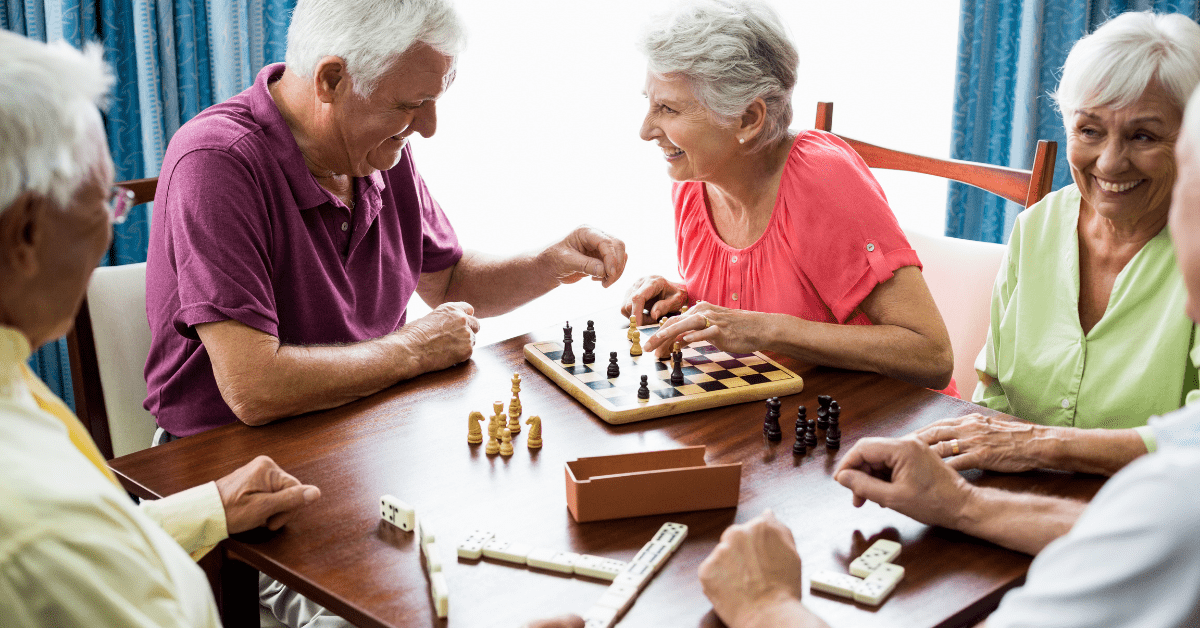Games do more than just entertain people in assisted living settings – they serve as powerful tools that keep older adults’ minds sharp and can even improve their cognitive function. Research shows that when seniors participate in brain games, they can improve their memory, attention and processing speed by a lot. Seniors who play games regularly develop higher levels of brain proteins that strengthen neural connections, enhancing memory and potentially slowing cognitive decline in those with dementia.
The Cognitive Benefits of Games in Assisted Living
Research shows that seniors with mild cognitive impairment who engage in word games and hobbies demonstrate improved memory, attention and processing speed compared to non-players. Each game type offers unique benefits—bridge enhances memory and focus, chess builds reasoning skills and puzzles improve spatial awareness, while even short periods of digital gaming can boost recognition memory.
The social aspect of gaming provides additional cognitive benefits, with many seniors reporting that playing with friends helps them feel mentally sharp and socially connected.
Beyond cognitive stimulation, games reduce stress, provide a sense of achievement and offer meaningful engagement, making them valuable activities in assisted living communities for maintaining overall quality of life.
Five Types of Games and Their Mental Advantages
Games can benefit seniors’ cognitive abilitiess in assisted living environments in different ways. Each type of game targets specific mental functions and provides various tools for mental stimulation.
- Card games like bridge and rummy keep seniors mentally sharp by exercising strategic thinking and pattern recognition while fostering friendships.
- Board games such as chess enhance planning abilities and decision-making skills by encouraging forward thinking.
- Word games, including crosswords and Scrabble, strengthen language skills, vocabulary and memory while improving focus.
- Digital games serve as effective brain training tools, improving multitasking, attention span and working memory in older adults.
- Jigsaw puzzles build visual-spatial reasoning, while memory-matching games strengthen recall abilities. Specially designed games accommodate seniors with cognitive challenges, making brain exercise accessible to all.
How to Implement Cognitive Games in Senior Living Communities
Implementing cognitive games in the senior living community lifestyle in Wisconsin requires thoughtful planning and personalized approaches.
Regular gameplay has been shown to delay memory decline, potentially reducing dementia risk while maintaining cognitive function. Card games sharpen memory, board games build strategic thinking, word games enhance language skills and digital games offer adaptable challenges for all ability levels.
 Effective programs require planning, comfortable environments and personalized activities. Technology integration and strategic partnerships further enhance cognitive stimulation opportunities.
Effective programs require planning, comfortable environments and personalized activities. Technology integration and strategic partnerships further enhance cognitive stimulation opportunities.
Cognitive Games: Sharpening Minds in Assisted Living
Cognitive games help improve mental sharpness anda good life for seniors in assisted living environments. These activities do more than just entertain—they deliver real benefits for memory, attention and processing speed. They also create meaningful social bonds. Care providers can target specific cognitive functions through different types of games that match individual needs and skill levels.
These games address both mental health and social needs, providing seniors with meaningful moments of achievement and connection that maintain dignity and purpose in their later years.
Your seniors deserve engaging activities that enhance cognitive health while bringing joy to their daily lives. Contact Heritage Senior Living at (844)-658-4475 today.
FAQs
Q1. What types of cognitive games are beneficial for seniors in assisted living?
Various games can benefit seniors, including card games like bridge for memory and focus, board games like chess for problem-solving, word games like crosswords for linguistic skills and digital games for overall cognitive function. Even simple activities like jigsaw puzzles can improve visual-spatial reasoning and short-term memory.
Q2. How do cognitive games help seniors in assisted living environments?
Cognitive games can improve memory, attention and processing speed in seniors. They also help maintain cognitive function, potentially delay memory decline and may reduce the risk of dementia. Additionally, these games provide social engagement, reduce stress and offer a sense of accomplishment.
Q3. Are there specific games recommended for seniors with cognitive impairments?
Yes, specially designed memory card games with larger prints and familiar images are excellent for seniors with cognitive impairments. These games provide accessible cognitive engagement while fostering social interaction and can be adapted to various ability levels.

